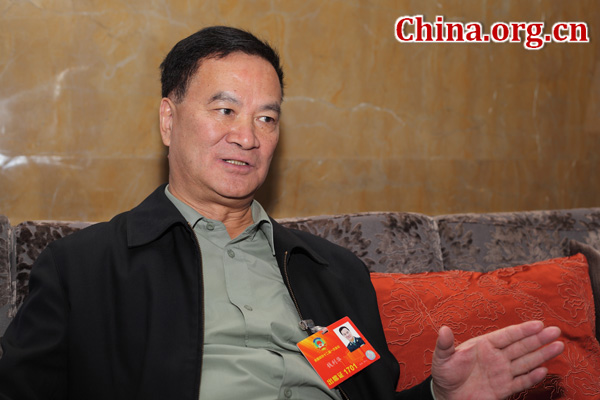Military protection: a must for maritime economy
 0 Comment(s)
0 Comment(s) Print
Print E-mail China.org.cn, March 10, 2013
E-mail China.org.cn, March 10, 2013
|
|
|
Qian Lihua, a CPPCC member and former director-general of the Office of Foreign Affairs of the Ministry of National Defense, is interviewed by China.org.cn. [Photo: China.org.cn /?Chen Weisong]? |
Maritime related topics have aroused heated debate among the public lately. CPPCC member Qian Lihua, former director-general of the Foreign Affairs Office of the Ministry of National Defense, said that maritime development is not only part of military construction, but also implies making use of maritime resources for the country's development of economy and people's livelihood. To focus on maritime strategy does not mean fulfilling tasks through military means.
"Exploiting marine resources, developing the marine economy, protecting the marine ecological environment, resolutely safeguarding China's maritime rights and interests and transforming China into a maritime power" is the strategic decision put forward in the?report at?the 18th National?Congress of the Communist Party of China (CPC). During the NPC and CPPCC sessions this year, "developing the maritime economy" was mentioned in the government work report once again.
According to the State Council's plan for institutional restructuring and function transformation released today, the cabinet plans to reorganize China's State Oceanic Administration, in order to promote the unification the oceanic law enforcement. The administration, a new agency going by the name of the National Oceanic Administration, will carry out the duties of safeguarding oceanic rights and law enforcement. The plan also mentions creating a high-level coordinating institution -- China's Maritime Commission, responsible for researching on and formulating the country's maritime development strategy and coordinating the major ocean affairs.
Qian emphasized that the maritime strategy was a goal laid out during the 18th National Congress of the CPC, which is also an important component in China's overall national strategy. "China is a continental country, and at the same time is an oceanic one. China's development, caused by objective reasons, was geographically restricted to the continental territory in the past decades, so the oceanic development has been neglected. However, in the 21st Century, the ocean has become an indispensable region that human beings live by. The world's nations all attach great importance to the exploration of the ocean," said Qian.
When asked about the suspicion and attention from abroad in regards to China's maritime strategy,?aroused by?the Diaoyu Islands and South China Sea disputes, Qian replied, "There is no need for suspicion because countries around the world are all using oceanic resources. Why couldn't China do so? We just put forward a strategy. "
"China's maritime strategy is not isolated, which should be considered together with China's overall strategy. And only by considering topics of construction and peaceful development can the world understand why China adopts this maritime strategy," said Qian.
"The development of a marine economy is an important part of maritime strategy. Military forces could provide security protection for the development of the economy. A weak economy is unable to provide enough expenditure for military construction," Qian noted.
In response to media reports that the Chinese Navy will face the most complicated diplomatic environment after the official commission of its first aircraft carrier, the Liaoning, Qian said a nation's military strategy depended on the actual needs of national defense and army building, as well as on the country's role to safeguard national sovereignty and integrity of its territory.
"The Liaoning, the country's first aircraft carrier, cannot decide China's military strategy, nor does it shoulder the responsibility of safeguarding national sovereignty and guaranteeing development interest," said Qian. "It is not a means of public diplomacy and military diplomacy. The main tasks of the Liaoning aircraft carrier are training and piloting."






